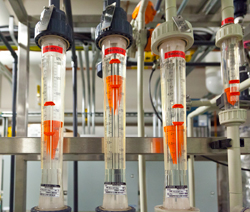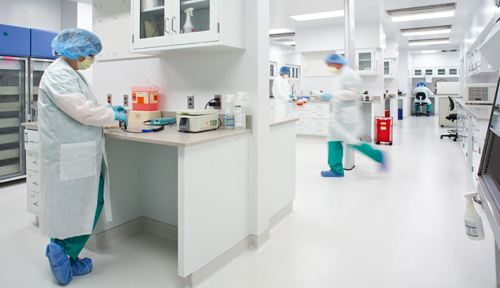The nondescript brick building on the corner of 42nd and Emile streets is a “clean building,” and it has numerous features and checks and balances in order to make and keep it that way.
It has few crevices in which particles might settle. Its air flows one way, through filter after filter after filter. There are air locks and pressure differentials. The people who work in it sometimes wear gowns and gloves or “bunny suits.”
Equipment, environment and quality are monitored by computer.
Phyllis Warkentin, M.D., the site’s medical director, a professor of hematology and oncology, had dreamed of the possibility of a building like this for a long, long time.
 |
The facility features an in-house United States Pharmacopeia (USP) purified water system for cleaning and terminal sterilization. |
This is the Biologics Production Facility (BPF) at UNMC.
The closest comparable facility is likely the Mayo Clinic. The med center’s 20,000 square-foot facility opened in 2010.
“When it comes to translational research, bench top to bedside,” Dr. Warkentin said, “what we do is somewhere in the middle.”
They store, change and make things. Things like stem cell products, cellular vaccines and gene therapies, tissue therapies, regenerative medicine therapies and nanomedicine.
“The facility strategically equips us to keep up with the rapid expansion of personalized and regenerative medicine,” said operations manager Charlie Branson.
The blood stem cells collected in The Lied Transplant Center (and other places around the country), for example, are processed, frozen and stored here.
Or, the team at BPF can also make more advanced products, products that need to be manipulated, processed, incubated, stored, cultured, transfected, and more.
They can, for example, take a pancreas that isn’t working as it should, and isolate the good stuff — taking out the cells that make insulin, pancreatic islets, and give them back to the patient.
They can select out a certain subpopulation of cells, mix them together with another to make a better product. Using standardized procedures, they can turn individual patients’ blood and marrow cells into personalized vaccines.
The conditions need to be cleaner than an operating room, and are. But the system of quality is “clean” too. Quality isn’t checked at the end, rather, built into everything.
The entire operation is under the auspices of current Good Manufacturing Practices (cGMP).
“I believe that the successful operation of the BPF to date will play an important role in providing a full spectrum of therapeutics to our patients with the advent of the new Fred & Pamela Buffett Cancer Center,” Branson said.
